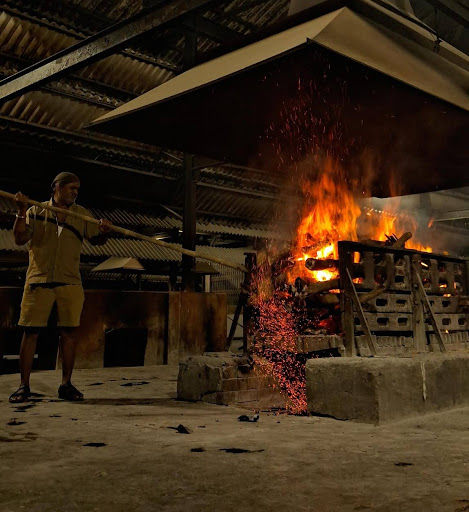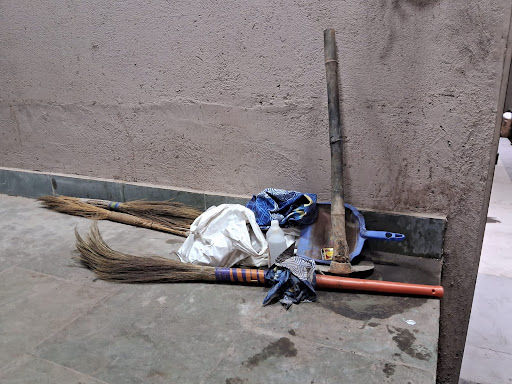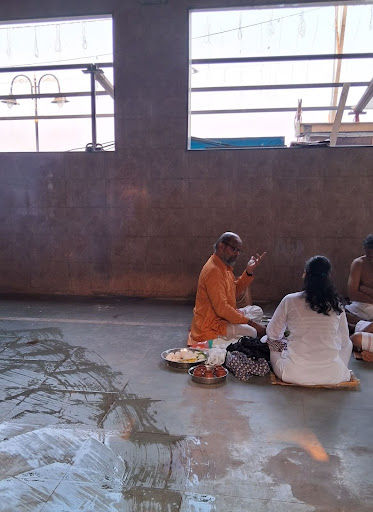Caste, Crematoriums and Continued Discrimination
- Mokshada Mali
- Apr 4
- 5 min read
~by Mokshada Mali
They do the work no one would, but face discrimination

“It has become a fashion to say Ambedkar repeatedly. If they had taken God’s name this many times, they would have secured a place in heaven for lifetimes." Recently Amit Shah stated this in the Parliament to the opposition, especially the Congress party. The mocking remark hurt the sentiments of all Ambedkarites, the lower caste or Dalit community whose cause he had championed.
This remark became the subject of debate among people like Mr Pravin Sarode at his place of work. It is not any other regular workplace but a crematorium. It is seemingly the final resting place after death for Hindus but, here too, caste-based discrimination prevails as my visits showed. The main rituals of the dead during cremation and for many days after are performed by Brahmins or upper caste priests while the ‘unclean’ work such as making and cleaning the pyre, handling the waste and so on is done by the low caste or Dalit workers. They go unnoticed, as I saw, the Mahars, Chamars and other marginalized castes as invisible here as in the rest of the society in India.
Mr. Pravin Sarode, who did not pass his Class 10th exams, works at the Shivaji Park Hindu crematorium. A Buddhist or neo-Buddhist as most followers of Dr Ambedkar are, he got this job in the Brihanmumbai Municipal Corporation (BMC) after his father passed away, on grounds of compassion based on the prevailing policy. Before doing the menial work in the crematorium, he used to work as a sanitary labourer for 14 years.
“Yes, it's true” he says, “People have ambitions to work in specific areas such as hospital ward boys or in an office. But we are ready to work anywhere. They gave us a position in the crematorium.”

As a laborer in a crematorium his job includes preparing pyres, keeping dead bodies, fewer times offering fire and collecting ashes in the end. "Even if we have expectations, what's the point," he asks when questioned about the lack of facilities,“There is no facility where we actually want it, our office has been broken for a year, there is no specific place where we can have our lunch, we have to go out and eat,” he says.
Mr. Vinod Pawar, a labourer working in the Chandanwadi electric crematorium shares similar stories of neglect, “We have everything with which the crematorium work needs to get done but even soap is not supplied to us to take a wash after we do all the cleaning.”

According to official data, there are a total of 50 crematoriums run by the BMC in addition to about 20 private ones. The work takes its toll on the workers, especially on their health. “We suffer a lot, it's the kind of work which causes us colds and coughs. We are prone to slow poisoning of a certain kind” Pravin says, “It has become normal for me. Earlier too, my community people used to do the same work of carrying the body, handling while it’s burning, and so on. So, we have no fear but there are health concerns.”

While labourers in crematoriums endure harsh conditions, priests who perform rituals are treated better with more respect and better working environments, such as people who come there for rites and rituals they share seats with priests often hesitate with labourers. Whatever ingredients priestly people need are arranged by ritual contactors, so therefore they only come early in morning, perform the rituals around 12 noon and go ahead for further work.
Not surprisingly, it is caste-based work as priests learn the holy texts and are inculcated into performance of rituals by birth either from their older generations or Vedic schools. While caste-based occupations are a matter of hot debate, the silent discrimination in the nature of work done by priests and workers in a crematorium shows how caste continues to discriminate.

Guruji Suresh Bhat, a priest at the Shivaji Park crematorium, says , “One works according to one’s destiny. They (the labourers) continue working according to their community too. If the father is a doctor, eventually his son also follows the same path; that’s how it is. The workers also have reservations, that’s why they get this government job.” His statements give away the deep-rooted belief in society that the crematorium workers are generationally meant to do the menial work.
In government or municipal jobs, compassionate employment is typically provided to the next of kin after a worker dies and this is usually applied to certain Group C and Group D jobs that encompass sanitation work, cleaning and so on. However, a worker who gets a job on compassionate ground is not given promotion or better or higher prospects in the job. This means that sons of crematorium workers who are now employed in the same work as their fathers were have no way to escape the drudgery and discrimination to rise in the work.
Officially, caste-based work and discriminatory practices are denied. In the BMC’s F South ward office at Parel, the head clerk in the Public Health department told me, “There is nothing such as one community of people continuing to do this work, we have labourers from all communities, they belong to Group C and D category 10th pass who apply for government jobs. We have provisions such as internal exams where these workers can give exams and can get positioned at a higher level.”
I reached out to the noted Dalit scholar and author of Dr. Anand Teltumbde on this issue (hear our podcast ‘Unheard Truths’ linked here Unheard Truths (3).mp3)
He says, “The government should institute some education facilities so that they move upward in the scale of the jobs. But I don't think that kind of policy they operate with. Once they enter this job, then from morning to evening they would just be doing the same thing.”

The electric crematorium works places less load on the workers but they say that people do not really prefer it. Mr. Johnny Kharat, working as technician in Shivaji Park Hindu Crematorium says, “The traditional system is dangerous for the environment and for us, yet people mostly prefer that system. The government supplies around 300 kilos of wood. The government always supports cashless transactions, metro, bullet train and basically new technology then why is there no campaign for electric cremation?”
Like others I spoke to, he too said that electric crematoria are safer in terms of health for the workers but, “a particular community has imposed these tasks on particular communities as they were illiterate.” Johny says.
The answer to this continued discrimination, according to Mr Vaibhav Kadam, a technician who works in Chandanwadi electric crematorium, is “To use Dr Babasaheb’s words:‘Educate, Agitate and Organise’ because without education this subtle and systematic construction of casteism will not end.”
“If we get an opportunity to work somewhere else we won’t prefer that, now we have become familiar with working here in a crematorium,” says Pravin. Somewhere not having the urge to learn, to study and hence get positioned better is missing and the reason for this is the poor living conditions that manifests itself as an after effect in their life.
Continue on this journey as Mokshada Mali delves deeper.
Podcast with Dr. Anand Teltumbde
Take a look at the Photo Essay

Comments